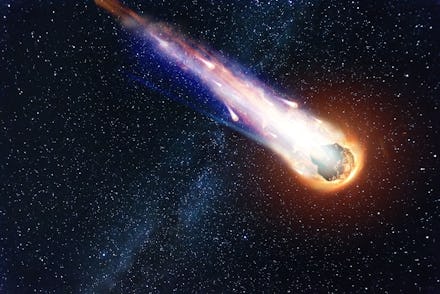Meteorites that fell to Earth 30 years ago are revealing new facts about our evolution

Talk about sweet: It looks like NASA has discovered something very intriguing in samples of meteorites that crashed into Earth billions of years ago. A team of researchers managed to find what they referred to as "bio-essential" sugars in the meteorites, according to an official statement via press release. In short, these meteorites were found to contain some of the most important building blocks of life, likely created via chemical reactions within the asteroids themselves.
To be clear, most meteorites are fragments of asteroids that broke apart while orbiting the sun. Asteroids are large, rocky objects near Earth, much larger than the pieces that break off into chunks and fall to the planet's surface.
In a study published in the Proceedings of the National Academy of Sciences, three different meteorites (including one that landed in Australia around 30 years ago) were studied and found to have contained sugars such as arabinose, xylose, and ribose. Ribose is an integral part of human biology, which can be found in our ribonucleic (RNA) molecules. RNA plays an important part when it comes to delivering messages from our DNA to build proteins in the body.
DNA, as you may already be aware, is an essential part of building life. RNA molecules are equally important, however, and according to NASA, the surprising discovery of ribose in the meteorites in this study could indicate that RNA evolved before DNA did. That gives scientists a better indication of how life itself could have begun so many years ago.
"It is remarkable that a molecule as fragile as ribose could be detected in such ancient material," said Jason Dworkin of NASA in the published study. Scientists have attempted to analyze these same meteorites where the ribose and other molecules were found in the past, but they opted for a different method this time around that proved successful: a mixture of water and hydrochloric acid. However, other investigations in the past did not include sugars, an integral piece of the puzzle.
“Other important building blocks of life have been found in meteorites previously, including amino acids (components of proteins) and nucleobases (components of DNA and RNA), but sugars have been a missing piece among the major building blocks of life,” Yoshihiro Furukawa of Tohoku University, Japan, explained. "The research provides the first direct evidence of ribose in space and the delivery of the sugar to Earth. The extraterrestrial sugar might have contributed to the formation of RNA on the prebiotic Earth which possibly led to the origin of life."
Going further, the research team is planning to take additional meteorites and analyze them to see if they emerged by way of contamination by terrestrial life on Earth or if the asteroids themselves somehow generated a reaction that resulted in the sugars. The team believes that contamination is highly unlikely, however, utilizing various forms of evidence.
This is absolutely a big win for the way scientists understand how life came about as well as the essential pieces that come together to create it. For such a blinding accomplishment to have come from meteorites from so long ago, it makes you wonder: what else are these stones hiding from us, and will researchers unlock their secrets as well?